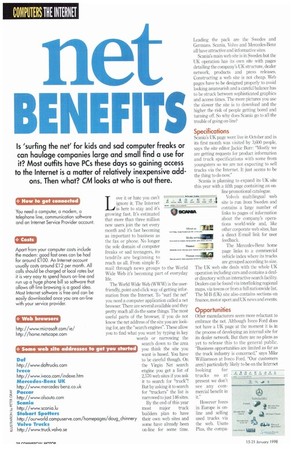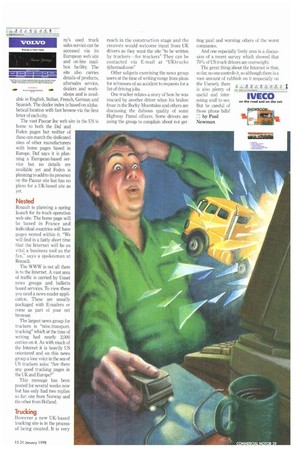COINPOTERS THE INTERNET
Page 50

Page 51

If you've noticed an error in this article please click here to report it so we can fix it.
Is 'surfing the net' for kids and sad computer freaks or can haulage companies large and small find a use for it? Most outfits have PCs these days so gaining access to the Internet is a matter of relatively inexpensive add ons. Then what? CM looks at who is out there.
How to get connected
You need a computer, a modem, a telephone line, communication software and an Internet Service Provider account.
CL:=I
Apart from your computer costs include the modem: good fast ones can be had for around £100. An Internet account usually costs around El 2 per month. All calls should be charged at local rates but it is very easy to spend hours on-line and run up a huge phone bill so software that allows off-line browsing is a good idea. Most Internet software is free and can be easily downloaded once you are on-line with your service provider.
• Web browsers
http://www.microsoft.com/ie/ http://home.netscape.com
Some web site addresses to get you started Daf
http://www.daftrucks.com
Iveco
http://www.iveco.com/indexe.htm
Mercedes-Benz UK
http://www.mercedes-benz.co.uk
Paccar
http://www.alsauto.com
Scania
http://www.scania.lu
Stobart Spotters
http://ourworld.compuserve.com/homepages/doug_chinnery
Volvo Trucks
http://www.truck.volvo.se
Love it or hate you can't ignore it. The Internet is here to stay and it's growing fast. It's estimated that more than three million new users join the net every month and it's fast becoming as important to business as the fax or phone. No longer the sole domain of computer freaks or sad teenagers, its tendrils are beginning to reach us all. From simple Email through news groups to the World Wide Web it's becoming part of everyday life.
The World Wide Web (WWW) is the userfriendly, point-and-click way of getting information from the Internet. 'lb "surf the net" you need a computer application called a net browser. There are several available and they pretty much all do the same things. The most useful parts of the browser, if you do not know the net address of the site you are looking for, are the "search engines". These allow you to find what you want by typing in key
■ •••• 1••■
N•191.11weellip.
al.. MIMI
words or narrowing the search down to the area you think the site you want is based. You have to be careful though. On the Virgin Net search engine you get a list of 2,570 web sites if you ask it to search for "truck"! But by asking it to search for "truckers" the list is narrowed to just 146 sites.
By the end of this year most major truck builders plan to have their own web sites and some have already been on-line for some time. Leading the pack are the Swedes and Germans. Scania, Volvo and Mercedes-Benz all have attractive and informative sites.
Scania's main web site is in Sweden but the UK operation has its own site with pages detailing the company's UK structure, dealer network, products and press releases. Constructing a web site is not cheap. web pages have to be designed properly to avoid looking amateurish and a careful balance has to be struck between sophisticated graphics and access times. The more pictures you use the slower the site is to download and the higher the risk of people getting bored and turning off. So why does Scania go to all the trouble of going on-line?
Specifications
Scania's UK page went live in October and in its first month was visited by 3,600 people, says the site editor Jackie Burr: "Mostly we are getting requests for product information and truck specifications with some from youngsters so we are not expecting to sell trucks via the Internet. It just seems to be the thing to do now."
Scania is planning to expand its UK site this year with a fifth page containing an online promotional catalogue.
Volvo's multilingual web site is run from Sweden and contains a large number of links to pages of information about the company's operations world-wide and, like other corporate web sites, has a direct E-mail link for user feedback.
The Mercedes-Benz home page links to a commercial vehicle index where its trucks are grouped according to size. The UK web site deals with the whole UK operation including cars and contains a dealer directory with an interactive search facility Dealers can be found via interlinking regional maps, via towns or from a full nationwide list. The M-B (UK) site also contains sections on finance, motor sport and UK news and events.
Huri PAM
Opportunities
Other manufacturers seem more reluctant to embrace the net. Although Iveco Ford does not have a UK page at the moment it is in the process of developing an internal site for its dealer network. But there are no plans as yet to release this to the general public. "Business opportunities are limited as far as the truck industry is concerned," says Mike Williamson at Iveco Ford. "Our customers aren't particularly likely to be on the Internet looking for trucks so at present we don't see any corn mercial benefit in it."
However Iveco in Europe is online and selling used trucks via the web. U.sato Plus, the compa ny's used truck sales service can be accessed via its European web site and on-line mailbox facility The site also carries details of products, aftersales service, .ate dealers and work shops and is available in English, Italian, French, German and Spanish. The dealer index is based on alphabetical location with fast browse via the first letter of each city
The vast Paccar Inc web site in the US is home to both the Daf and Foden pages but neither of these can match the dedicated sites of other manufacturers with home pages based in Europe. Daf says it is planning a European-based service but no details are available yet and Foden is planning to add to its presence on the Paccar site but has no plans for a UK-based site as yet.
Nested
Renault is planning a spring launch for its truck operation web site. The home page will be based in France and individual countries will have pages nested within it. "We will find in a fairly short time that the Internet will be as vital a business tool as the fax," says a spokesman at Renault.
The WWW is not all there is to the Internet A vast area of traffic is carried by Usnet news groups and bulletin board services. To view these you need a news reader application. These are usually packaged with E-mailers or come as part of your net browser.
The largest news group for truckers is "misc.transport. trucking" which at the time of writing had nearly 2,000 entries on it. As with much of the Internet it is heavily US orientated and on this news group a lone voice in the sea of US truckers asks: "Are there any good trucking pages in the UK and Europe?"
This message has been posted for several weeks now but has only had two replies so far: one from Norway and the other from Holland.
Trucking However a new UK-based trucking site is in the process of being created. It is very
much in the construction stage and the creators would welcome input from UK drivers as they want the site to be written by truckers—for truckers" They can be contacted via E-mail at "UKtrucks @hotmail.com" Other subjects exercising the news group users at the time of writing range from pleas for witnesses of an accident to requests for a list of driving jobs.
One trucker relates a story of how he was rescued by another driver when his brakes froze in the Rocky Mountains and others are discussing the dubious quality of some Highway Patrol officers. Some drivers are using the group to complain about not get
ting paid and warning others of the worst companies.
And one especially lively area is a discussion of a recent survey which showed that 70% of US truck drivers are overweight.
by Paul Newman
















































































































